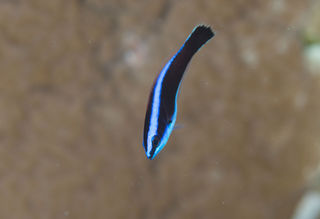Confidence
The Mirror Test and the Problem of Understanding Other Minds
What the debate about self-awareness reveals about understanding other minds.
Posted December 17, 2018
It isn’t until about two years of age that a human being can recognize the image in the mirror as a reflection of herself. It takes time for us to pass the mirror test. And we’re pretty special in this regard. Only a handful of other species ever achieve this milestone. The classic test procedure is to place a visible mark (e.g., a red dot or sticker) on an animal and place it in front of a mirror. If the creature stares unusually long at the part of its body with the mark or tries to rub it off, then it is said to pass the test. A variety of great apes, Asian elephants, bottlenose dolphins, orca whales, Eurasian magpies, and even ants have all received passing marks. It’s an exclusive club.

A recent entry on the list has, however, raised some hackles. The cleaner wrasse has been observed performing behaviors that mimic other species’ that have been considered as passing the mirror test. Some of the fish in the experiment who were marked and placed in front of a mirror appeared to scrape the marked parts of their bodies on the floor of their tanks in an attempt, it seemed, to rub off the mark. The study’s authors suggest that this may be evidence these fish are members of the exclusive club of self-recognizers, or it may be evidence the mirror test doesn't show what it purports to.
The conventional view is that passing the mirror test reveals that one is capable of self-recognition, perhaps even self-awareness, which is thought to be a precondition of recognizing that others have minds like yours. This, in turn, is thought to be a precondition of empathizing with them. If you can’t take yourself as an object of thought, then you can’t track your own mental states. And if you can’t even track your own thoughts and feelings, then you can’t take account of others’, for example, by weighing the pain your conduct will cause them against the pleasure it will provide you. Self-awareness is a prerequisite for taking part in the sophisticated give-and-take involved in high-level social cooperation, such as that presupposed by the notion of a moral community. Perhaps not every self-recognizer is a moral animal, but all moral animals are self-recognizers.
Controversy about the mirror test and its lessons may reflect uneasiness about our place in the hierarchy of the animal kingdom. If other species, including fish, can pass the test, does that mean we’re not special? But the test doesn’t only raise existential questions such as this. Controversy over who should be considered as passing and why also complicates the problem of other minds.
The classic version of the problem is this: What justifies the (nearly) universal assumption that other human beings have minds like yours? You know from the inside, as it were, that you feel pain. And you assume others do as well. But how do you know that they do? Some skeptics contend that you can’t know that other minds exist, let alone what’s in them. But even though the skeptics are in the minority, the search for truth isn’t a democracy. And there’s no widely accepted answer to the problem. Perhaps the mirror test provides some comfort to those in the majority. Just about all human beings over the age of two recognize themselves in the mirror, just like you do. And that gives you some reason to think that they have minds like yours.
But debates about the mirror test reveal a different version of the problem of other minds, one that has received less attention, even though it, too, highlights the limits of human knowledge. Two issues serve to illustrate this second version of the problem. First, there are questions about which behaviors would indicate self-recognition. It may be that a human being would only try and rub a mark off her skin if she recognized that the reflection in the mirror was herself. But, as some critics of the cleaner wrasse study suggest, perhaps another species would be prompted to rub its skin, not because it consciously recognized a reflection as itself, but because the sight of a creature with such a mark in the mirror triggered an instinctual reaction. Seeing another fish with something on its belly may trigger rubbing behaviors in the fish looking in the mirror. Second, there are questions about the perceptual capacities required to pass the test. Not all animals are as visual as we are. Perhaps more species would be considered capable of self-recognition if the test exploited, say, olfactory abilities.
The lesson seems to be that we should think critically about what inferences we make about other kinds of creatures based on what we know about ourselves. We can put the second problem of other minds like this: What justifies the (near) universal assumption that other minds are like our own? This isn’t exactly a new question. We know, for example, of apparently sentient creatures whose neural makeup is radically different than ours. But it is a question that is put into stark relief by debates about the tools we use to make determinations about other animals’ minds. Perhaps most maddeningly, it is a question that cuts to the core of our means for acquiring more and better knowledge of our fellow creatures. Our best methods for measuring and observing other species will always and forever be our best methods. For better and for worse, they are human tools for human inquiry. In the spirit of critical self-reflection, it’s worth keeping in mind that they may encode assumptions and contain limitations that complicate the apparent objectivity of what our tools for inquiry can reveal about the world around us.
Come to think of it, perhaps passing the mirror test isn’t best thought of as conferring honorific membership in an exclusive club. Rather, it is the sign of membership in a species capable of experiencing bouts of existential panic and crises of confidence prompted by recognition of the limits of our attempts at making up our minds.


